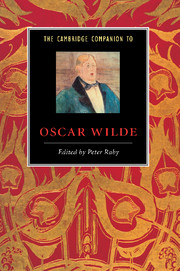Book contents
12 - 'A complex multiform creature' - Wilde's sexual identities
from Part III - Themes and influences
Published online by Cambridge University Press: 28 May 2006
Summary
If Oscar Wilde is remembered for anything since his turn-of-the-century demise, it is his meteoric rise as a raconteur, playwright and cultural critic, and his startlingly rapid fall into disrepute as a homosexual committed to two years in solitary confinement with hard labour in Reading Gaol. Since this memorable story has been told so many times and in so many versions - not least in his own work of life writing, posthumously named De Profundis, and in biographies as notable and substantial as Richard Ellmann's - one would reasonably imagine that we must now know all there is to discover about Wilde's scandalous sexual behaviour, not to say the imprint of transgressive desire across the gamut of his works. Indeed, the enduring interest in his life and writings - from Peter Ackroyd's fictional The Last Will and Testament of Oscar Wilde (1983) to Philip Prowse's visually arresting productions of the Society comedies - suggests that Wilde addresses issues that still vibrantly preoccupy our own fin de siecle, particularly where questions of sexual identity are concerned. This is especially the case in the world of scholarly research where the upsurge of critical attention paid to Wilde's oeuvre has risen sharply in the light of a burgeoning lesbian and gay studies since the mid-1980s. Such developments have meant that academic readers are now altogether freer in articulating the homoerotic patternings that would seem to inflect his writings from beginning to end.
- Type
- Chapter
- Information
- The Cambridge Companion to Oscar Wilde , pp. 195 - 218Publisher: Cambridge University PressPrint publication year: 1997
- 6
- Cited by



